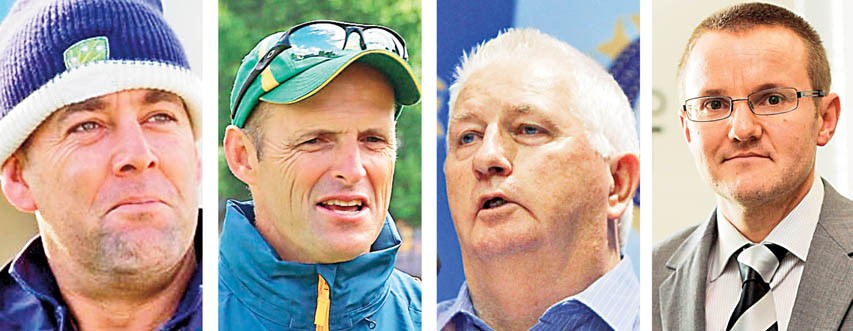
Pakistan cricket team could have been a contender had the coach been someone who knew how to play in Australia rather than someone who lives there

The World Cup is over and Team Australia has clinched the Cup for the record fifth time. Darren Lehmann became the second World Cup winner after Geoff Marsh to coach his team to glory (after Geoff Marsh -- player 1987, coach 1999) and must be commended for his effort because his team wasn’t amongst the ‘most favourites’ to win the tournament. The young outfit must thank their coach Darren Lehmann for instilling the belief in them that they can be the world champions, for he did a marvelous job by staying close to the Australian way -- be aggressive, no matter what!
Why Darren Lehmann managed to succeed where others failed, and from others I mean better cricketers than him. He wasn’t the best batsmen in the Australian middle-order nor was he the go-to spinner when the captain wanted to switch to slow bowling, yet as coach he knew what his captain’s needs were. How? The answer is simple -- he had his heart and mind at the right place and made decisions based on logic rather than emotions unlike the coaches in India and Pakistan.
Had he been associated with a subcontinent team, on dropping the leading all-rounder (Shane Watson for Australia, you-know-who-for-Pakistan) during the mega event, his house might have been stoned, family members might have been harassed and his effigy might have been burned by cricket idiots going as enthusiasts. Nothing of that sort happened in Australia as Shane Watson returned a better player and was there when Steven Smith hit the winning runs for his team in the final.
Secondly, he went about with a unit that respected him for his position, not for his heroics as a cricketer and listened to him. That’s why when Michael Clarke was unfit, George Bailey took to the captaincy and there was no revolt. When Clarke was back in the side, George Bailey became the 12th man because he knew he wasn’t in good form. There were no infightings, no news leaked from the dressing room and no groupings in the team. All played for Australia and won the World Cup.
And yes, then there is the team selection as well. Australian cricket team failed to qualify for the semifinals in 2011 and that hit them hard, considering they were the World Champions from 1999 to 2007. They kept just fiveplayers from that squad for the next edition and voila, the result is in front of us. Michael Clarke and Brad Haddin who were part of both 2011 and 2015 have now announced their retirements whereas Mitchell Johnson, Steven Smith and Shane Watson are the only survivors from the 2011 World Cup unlike Pakistan whose 9 out of the 15 players had represented the country in the mega event four years back. (Mohammad Hafeez and Junaid Khan got injured, Saeed Ajmal wasn’t sent with the team due to suspect action despite being cleared). And then there was the case of the same coach -- Waqar Younis!
It seems that wherever Waqar goes, controversies go with him. Be it his refusal to play Sarfraz Ahmed for no cricketing reason, his decision to back up Umar Akmal as wicketkeeper-batsman knowing that he will more likely fail than succeed, his ability to not think beyond a certain point and his mafia-like approach destroyed Pakistan’s chances of doing well in the once-in-a-four-year tournament. He was the coach in 2011 when the whole country was shocked to know that Shoaib Akhtar will not be playing in the semi-final against India and those who follow the game know who was behind the decision.
Pakistan cricket team could have been a contender had the coach been someone who knew how to play in Australia rather than someone who lives there. It was reported in the media that former Australian batsman Dean Jones, now a TV commentator, gave tips to Pakistani batsmen as to how to bat in Australian conditions but nobody seemed to listen. Except may be Sarfraz who went full steam ahead when he got the chance and succeeded!
Coaches are supposed to make or break a team. While Zimbabwean coach Dav Whatmore instilled into his team the confidence that they can beat any side in the world, Irish coach Phil Simmons showed the world that his side can and did beat the West Indies and Zimbabwe. Former players including World Cup winners Aaqib Javed and Marvan Atapattu coached United Arab Emirates and Sri Lanka but despite good individual performances, their teams failed to click when it mattered the most.
There were two coaches who hadn’t played international cricket but had contrasting fortunes in the mega event. England’s Peter Moores can single handedly be held responsible for his team’s woeful performance in the World Cup; not only he was instrumental in the ouster of Kevin Pietersen a few months back, he had a pivotal role in the sacking of Alistair Cook as well just a couple of months before the World Cup. The decision to bring in Eoin Morgan as captain backfired and England failed to qualify for the Quarter Finals, losing to Bangladesh in the crucial do-or-die encounter.
The person who seemed to have enjoyed the event the most was Mike Hesson, the former coach of the Kenyan team who joined the Black Caps three years back and steered them into the final of the World Cup, without losing a single match. Along with Brendon McCullum, he is the guy the Black Caps must be thanking for he had a vision; one that saw him sour his relations with McCullum’s predecessor Ross Taylor, take decisions that at first seemed illogical but now seem fruitful and stay in the background, something Pakistani officials must learn if they are to succeed in the future.